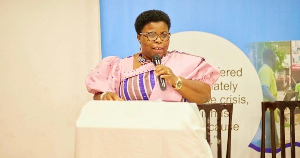- Home - News
- TWI News | TV
- Polls
- Year In Review
- News Archive
- Crime & Punishment
- Politics
- Regional
- Editorial
- Health
- Ghanaians Abroad
- Tabloid
- Africa
- Religion
- Election 2020
- Coronavirus
- News Videos | TV
- Photo Archives
- News Headlines
- Press Release
General News of Friday, 26 April 2024
Source: Richard Aniagyei, ISD, Contributor
Climate change, direct threat to Ghana’s food, healthcare systems - Professor Lydia Aziato
Climate change is no longer a distant threat, but a harsh reality already impacting rural communities’ ability to grow essential crops and access healthcare services amid extreme weather patterns.
Professor Lydia Aziato, Vice Chancellor of the University of Health and Allied Sciences bemoaned this in her opening remarks at the Climate Change and Health Summit held in Accra.
The summit, which brought together experts from the UK, Ghana and some West African regions, aimed to raise awareness and drive action on the pressing issue of climate change’s effects on public health.
“We can no longer view climate change as some far-off risk. Its consequences are being felt across our region right now, “Rural farming communities are struggling to maintain food security as drought, flooding, and unpredictable weather wreak havoc on agricultural cycles,” she added.
She highlighted how these same climate impacts are disrupting access to healthcare services, especially for isolated populations.
The summit featured comprehensive discussions on current climate and health research, policy priorities, and knowledge gaps specific to Ghana and West Africa.
Findings from collaborative local studies were shared by researchers from the University of Southampton and the University for Development Studies. Together, experts and stakeholders from ministries, NGOs, healthcare, academia, and industry emphasized the need for interdisciplinary solutions driven by evidence-based policies and community engagement.
“Accurate data is key to developing effective strategies for our healthcare system to adapt to escalating climate threats,” noted Dr. Wisdom Atiwoto of Ghana’s Ministry of Health Research division.
As the summit concluded, calls were made for urgent global cooperation and action to build resilient communities capable of withstanding climate change public health impact.











